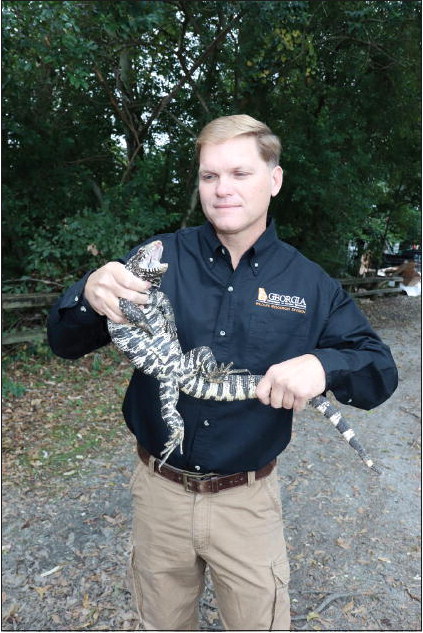Spot a Tegu? Let DNR Know


GIANT LIZARD – Jim Gillis, a wildlife technician with the Game Management Section of the Georgia Department of Natural Resources, displays an adult black and white Argentine tegu captured in this area. Gillis, who is assigned to a 17-county region in South Georgia, said the Toombs—Tattnall county line is a hot spot for reports on encounters with these invasive predators. The animals, which are popular in the pet trade, either escaped from captivity or were deliberately dumped in the wood by their owners. Male tegus can grow to four feet in length.
When you're outdoors in Toombs, Tattnall and neighboring counties, keep an eye out for tegus and tell Georgia DNR if you see one of these big South American lizards.
DNR is working with residents and other partners to remove a wild population of Argentine black and white tegus in this part of southeast Georgia. The population, likely started by escaped or released pets, poses a threat to native wildlife.
Adaptable and hungry, Argentine black and white tegus will eat the eggs of ground-nesting birds — such as quail, turkeys and whip-poor-wills — as well as those of other reptiles, including alligators and gopher tortoises, Georgia's state reptile. Tegus will also eat chicken eggs, fruit, vegetables, plants, pet food and small animals.
There are concerns that tegus will spread exotic parasites to Georgia wildlife and cause bacterial contamination of crops. Like most reptiles, they can carry salmonella, too.
As a non-native species, tegus in the wild can be trapped or killed on private property with landowner permission and in accordance with animal cruelty and local ordinances. But DNR wants to know about all sightings to better gauge the invasive lizards’ spread.
For key sites, DNR can provide loaner traps, advice and even help monitoring, said Daniel Sollenberger, a senior wildlife biologist.
'With area residents, hunters and other folks helping us find and control tegus, we are cautiously optimistic we can control this population.”
Tegus pose a challenge. Sollenberger said they are generalists in habitat, diet and the temperatures they can survive. “They can live almost anywhere and eat almost anything.”
How You Can Help Report tegus seen in the wild, alive or dead. Note the location, take a photo if possible and report the animal at gainvasives. org/tegus, (478) 994-1438 or gainvasives@dnr.ga.gov.
In Toombs and Tattnall counties, keep pet food inside, fill holes that might serve as shelter and clear yards of debris such as brush piles that can provide cover for tegus.
Wherever you live in Georgia, be a responsible pet owner. Do your research before buying an exotic pet, and don’t let it loose. Also, as of December 2022, pet Argentine black and white tegus in Georgia must be registered and tagged — or transferred to someone who has a wild animal license or permit — before Dec. 4, 2023.
Learn More
See native reptile species sometimes misidentified as tegus. Download flyers profiling tegus and their tracks. Find out how listing Argentine black and white tegus as wild animals affects owning one in Georgia. Visit georgiawildlife. com/tegus. Also watch: “The Danger of Tegu Lizards” (Georgia Public Broadcasting) Connect with Us
Questions? Give us a call at 1-800-366-2661 or visit georgiawildlife.com.
Wildlife Resources Division headquarters: 2067 U.S. Hwy. 278 SE, Social Circle, GA 30025





